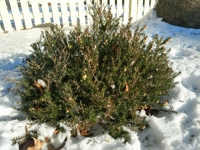
- Mark perennials and bulbs before they become covered in snow to help you identify plants in early spring.
- Check corms and tubers that you have in storage. Sort out any that show signs of disease and dispose of them.
- Back to top of page
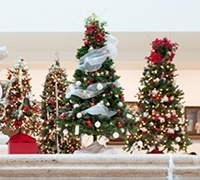
- Visit local historical sites and museums to view their holiday decorations. See the listing at VisitCT for an event near you.
- Contact your local garden club for a list of upcoming programs or sign up for a workshop, lecture, or course at your local garden center or through the UConn Master Gardener Program.
- Back to top of page
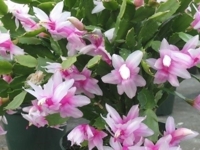
- Many holiday cacti now have extended blooming periods and come in large variety of colors.
- Holiday plants, including amaryllis, mistletoe, and yew are toxic and should be kept away from children and pets. Contact Poison Control at 1-800-222-1222 immediately if you suspect a problem.
- Be sure to keep poinsettia away from heat sources, drafts, and cold air. Keep soil consistently moist, but not soggy. Poinsettia that dry out droop dramatically and drop their flowers. Try something a bit more unusual like a cyclamen or kalanchoe for holiday plants.
- Amaryllis bulbs may be started now. If they are established bulbs in old pots, two inches of soil should be removed from the surface and replaced with a good, rich mixture.
- Decorative foil around the roots of holiday plants can hold water and drown them. Either remove it when you water, or poke drainage holes in the foil and use a saucer.
- Rotate windowsill plants a quarter turn each week to give all branches equal exposure to the winter sun.
- Check for spider mites on houseplants, mist plants and if mites are present you will see water droplets clinging to the mite’s webbing. Control them by misting daily to keep humidity high after giving them a thorough drenching in the sink.
- Reduced light during the winter can cause houseplants to become dormant. Be careful not to overwater them during this time although they may need to be watered more often when the heating system is on.
- Clean leaves of large and smooth- leaved house plants like dracaena, philodendron and ficus so they can absorb more sunlight. Rinsing off houseplants foliage can keep both dust and insects away. Set pots in the shower for a few minutes or rinse them in the sink.
- Back to top of page
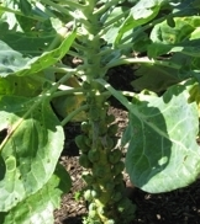
- Continue to harvest Brussels sprouts. They'll typically keep even when buried in snow drifts.
- Harvest any leeks and root vegetables such as carrots and parsnips that are still in the garden.
- Check vegetables that you have in storage. Sort out any that show signs of disease and dispose of them.
- Use garden notes, photos and sketches to plan out your garden for the upcoming season.
- Back to top of page
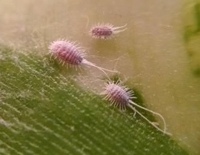
- Check houseplants for insect pests such as spider mites and mealy bugs and treat accordingly with low-toxicity insecticides.
- Back to top of page
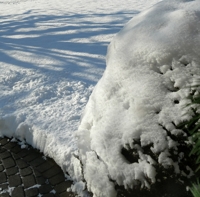
Fruits
- Check fruits that you have in storage. Sort out any that show signs of disease and dispose of them.
Lawns
- Avoid using salt to melt ice on driveways and sidewalks which may end up on the lawn, when possible use sand or kitty litter. This will help prevent salt damage to plant roots.
- Do not use fertilizer to melt ice. This creates nitrogen runoff issues that could damage local bodies of water.
- Don't walk on frozen grass, especially if there is no snow cover. Without the protection of snow, grass blades are easily broken causing die-back in your lawn.
Trees and Shrubs
- Tap the evergreen branches gently to remove snow and ice to prevent the branches from breaking.
- If you have a real Christmas tree, recycle it after the holidays are through. Cut off branches and use as insulation over perennials. In spring, chip or shred branches to create mulch or add to the compost pile.
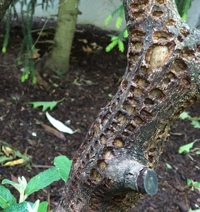
- Sapsucker (woodpecker) feeding damage may appear on trees as a series of holes.
- Be sure to keep bird feeders stocked with seed and suet for the winter months.
- Back to top of page
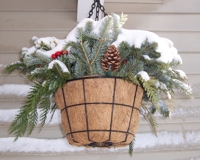
- Replace the plants in hanging baskets, containers, and window boxes with evergreen boughs, berries and pinecones.
- If you have friends or family that like to garden, think of gardening gifts for the holidays. Books, gloves, hand tools, weather instruments, and fancy pots are some fun ideas to consider.
- Store your opened bags of fertilizer in a sealed plastic bag or plastic waterproof container with a snugly fitting lid in a dry location to avoid caking.
- Turn compost piles one more time before they freeze for the winter.
- Back to top of page
Despite good cultural practices, pests and diseases at times may appear. Chemical control should be used only after all other methods have failed.
For pesticide information please call UConn Home and Garden Education Center weekdays, in Connecticut call toll free 877-486-6271. Out of state call 860-486-6271
Revised by the UConn Home and Garden Education Center 2022
Issued in furtherance of Cooperative Extension work, Acts of May 8 and June 30, 1914, in cooperation with the U.S. Department of Agriculture, the Dean of the College, Cooperative Extension System, University of Connecticut, Storrs. The Connecticut Cooperative Extension System is an equal opportunity employer and program provider. To file a complaint of discrimination, write USDA, Director, Office of Civil Rights, Room 326-W, Whitten Building, Stop Code 9410, 1400 Independence Avenue, SW, Washington, DC 20250-9410 or call (202) 720-5964.